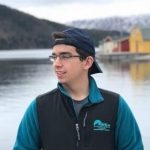Positionality and Research: Reid Publishes Article and Podcast on Campus-Community Research Relationships and the “Two-Eyed Seeing” Framework.


Brady Reid, recent graduate from the Master of Arts in Environmental Policy program at Grenfell Campus, recently published an article in the International Journal of Qualitative Methods entitled: “Positionality and Research: “Two-Eyed Seeing” With a Rural Ktaqmkuk Mi’kmaw Community”. The article originated as the second chapter of Reid’s master’s thesis and shares insights emerging from the project presented for researchers engaged with Indigenous communities or collaborators. Based in western Ktaqmkuk (Newfoundland), this article challenges prescribed notions of identity as defined by the Indian Act through the “status Indian” designation. Reid received his card as a status Indian as a teenager when the Qalipu Mi’kmaq First Nation was recognized in 2011; however, he self-identifies in the paper as a non-Indigenous researcher. The article draws on and shares parts of his journey of identity, focusing on the researcher’s positionality in research and suggests deeper self-reflection in a contemporary context.
This study was a collaborative project in the Mi’kmaw community of Ewipkek (Flat Bay) through the No’kmaq Village Band and Elder Calvin White, a known champion of Mi’kmaw rights in the province. The article presents current approaches, principles, and considerations for researchers working with Indigenous communities, drawing from both academic literature and the collaborative experience working with the community of Ewipkek. This project describes the different characteristics of a Western research paradigm versus an Indigenous research paradigm that can support the application of the conceptual framework “Two-Eyed Seeing”.
Alternatively, the podcast “Talking Thesis” is now live which accompanies the paper and allows for its audience to engage with the ideas / concepts from the article through a different medium. Set as a conversational discussion over a cup of tea, presenters Brady Reid, Elder Calvin White, and Kelly Anne Butler mix personal stories with lessons learned from the project as the conversation develops. Topics discussed include some history of Mi’kmaq in western Newfoundland, the establishment and registration process of the Qalipu Mi’kmaq First Nation, challenges faced by the community of Flat Bay and the Flat Bay Mi’kmaq Band, and important considerations and responsibilities for researchers working with Indigenous communities.


